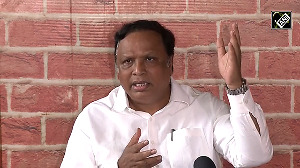Crorepatis build wealth through disciplined saving, smart investing and strategic risk-taking, proving that true financial freedom is earned, not inherited, says Ramalingam Kalirajan

We all dream of becoming wealthy, but how many of us take the right steps to achieve it?
Many fall for shortcuts that lead to financial pitfalls.
Ever wondered what truly sets crorepatis apart? Is it just luck or inheritance?
The reality is that wealth-building follows a pattern -- a set of well-defined strategies that anyone can adopt.
Let's uncover seven money secrets that crorepatis use to grow their wealth and secure their financial future.
Are you ready to take control of your financial destiny?
1. Earnings Are Not the Key Factor
Does earning more money automatically make you rich? Not necessarily.
The real key to building wealth isn't just how much you earn but how much you save and invest.
Consider two individuals:
- Kumar, who earns Rs 100,000 per month but invests only Rs 10,000.
- Muthu, who earns Rs 60,000 per month but invests Rs 20,000.
Both invest their savings in mutual funds with an average annual return of 13%. After 15 years:
- Muthu accumulates over Rs 1 crore.
- Kumar, despite earning more, accumulates only around Rs 55 lakh.
So, is a higher salary alone enough to make you rich? Clearly not.
What truly matters is consistent saving and strategic investing.
2. Taking Risks in Investment is Essential
Are you avoiding investments because they seem risky?
Crorepatis understand that avoiding risk entirely is itself a risk!
Fixed deposits and traditional savings might seem safe, but they often yield lower returns that fail to beat inflation.
Let's compare two investors:
- One invests Rs 20,000 per month in a low-risk investment offering 8% returns.
- Another invests Rs 20,000 per month in equity mutual funds offering 13% returns.
After 20 years:
- The 8% investment grows to Rs 1.2 crore.
- The 13% investment grows to Rs 2.3 crore.
By taking calculated risks, crorepatis ensure their money works harder for them.
Are you letting fear hold you back from potential wealth?
3. Using Time Wisely for Wealth Creation
Many people chase get-rich-quick schemes, but crorepatis know that true wealth is built over time.
Instead of trying to time the market, they focus on long-term investments in stocks, real estate, and gold.
For instance, real estate prices fluctuate, but those who invest when prices are low and patiently hold their assets benefit immensely.
The same applies to stock market investments -- history shows that time in the market beats timing the market.
Take Warren Buffett, one of the richest investors in the world.
He started investing in stocks at the age of 11 and built his fortune through the power of compounding.
Even if you don't start as early, staying invested for the long haul makes a significant difference.
Would you rather spend years searching for the perfect moment or let time compound your investments?
4. The Power of Writing Down Financial Goals
Do you have financial goals, or are they just vague ideas in your mind? Crorepatis don't just think about their goals -- they write them down.
A study by Thomas Corley, author of Rich Habits, found that:
- 67% of crorepatis write down their goals.
- 81% maintain a daily to-do list.
Writing down financial goals isn't just about motivation -- it helps track progress, stay accountable, and create a clear action plan.
A written goal, like 'Save Rs 50 lakh for retirement by 50,' is far more effective than a vague thought like 'I need to save more.'
Have you put your financial dreams on paper yet?
5. The Three Key Advisors Every Millionaire Has
Would you go on a road trip without a map?
Then why navigate finances without expert guidance?
Wealthy individuals always keep three key advisors in their financial circle:
A Lawyer: To handle legal matters and protect their assets
An Auditor: To ensure tax efficiency and compliance
A Financial Advisor: To craft investment strategies and optimise wealth growth
Many people avoid professional advice due to cost, but crorepatis know that expert guidance prevents costly mistakes.
Why take chances with your hard-earned money?
6. Cutting Down on Unnecessary Expenses
Do you track your daily expenses? Crorepatis do.
One common habit among the wealthy is avoiding unnecessary spending, like frequent dining out and impulsive shopping.
By reducing small expenses, they free up more money for investments. Small savings today can turn into significant wealth tomorrow.
Think about it -- if you cut down on non-essential spending, how much more could you save and invest?
A simple trick crorepatis use is the 24-hour rule -- before making an impulsive purchase, they wait a day to see if they still want it.
More often than not, they decide against it.
Could this strategy help you curb unnecessary expenses?
7. Planning for a Secure Retirement
Have you thought about your retirement?
Most people don't start saving until it's too late.
Crorepatis, however, prioritise early retirement planning to ensure financial independence in their later years.
A study by psychologists Paul Sullivan and Brad Klontz found that wealthy individuals actively save for retirement and create diversified portfolios.
On the other hand, those who neglect retirement savings often struggle financially later in life.
Even saving 10% of your income consistently can secure a comfortable retirement.
With increasing life expectancy and rising inflation, have you started planning for your future?
- You can ask rediffGURU Ramalingam Kalirajan your questions HERE.
Ramalingam Kalirajan, an MBA in finance, is a certified financial planner. He is the director and chief financial planner at Holistic Investment Planners, a leading financial planning and wealth management company.
Disclaimer: This article is meant for information purposes only. This article and information do not constitute a distribution, an endorsement, an investment advice, an offer to buy or sell or the solicitation of an offer to buy or sell any securities/schemes or any other financial products/investment products mentioned in this article to influence the opinion or behaviour of the investors/recipients.
Any use of the information/any investment and investment related decisions of the investors/recipients are at their sole discretion and risk. Any advice herein is made on a general basis and does not take into account the specific investment objectives of the specific person or group of persons. Opinions expressed herein are subject to change without notice.












